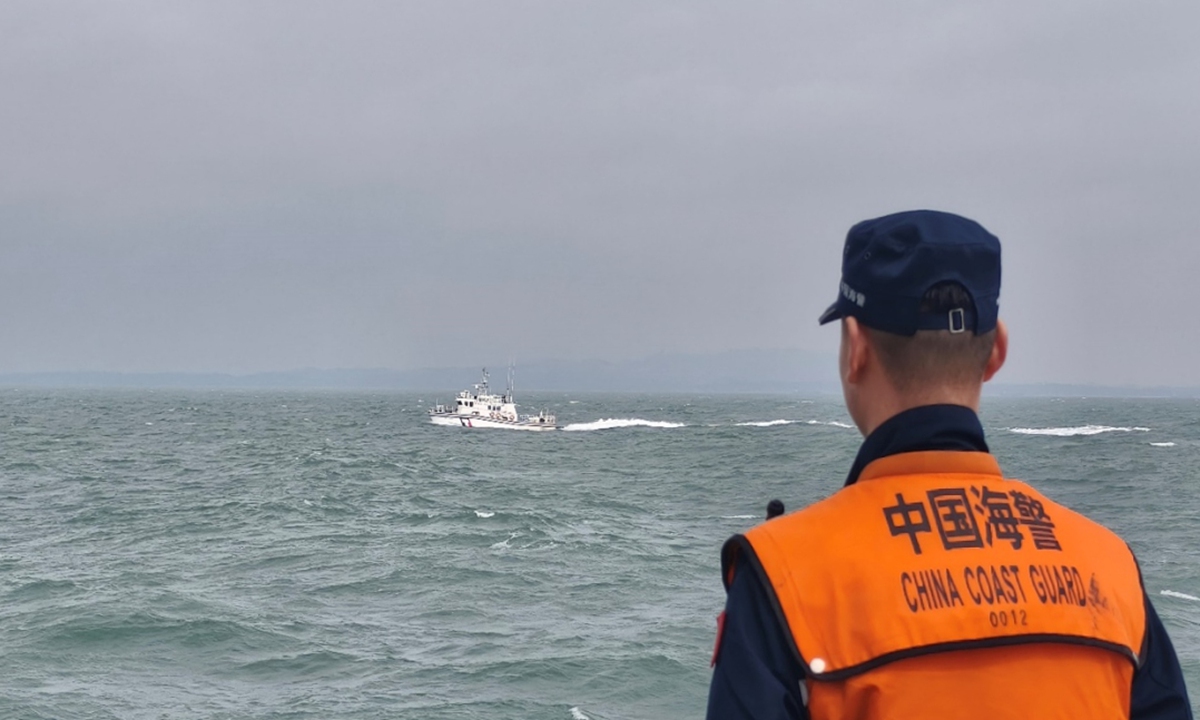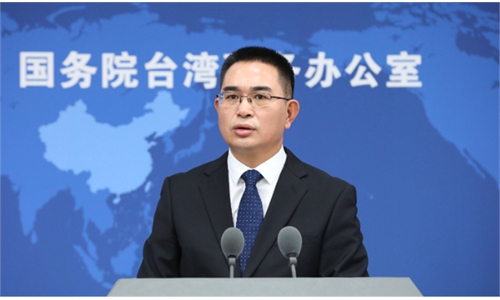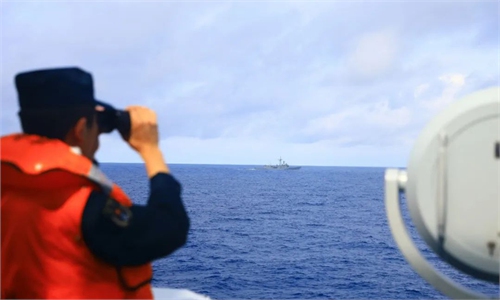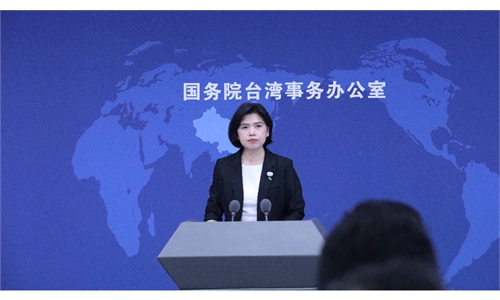Mainland and Taiwan reach deal over fishermen's deaths
Move considered 'a positive step,' experts caution against DPP political manipulation

The Fujian Coast Guard organizes a flotilla and conducts a law enforcement patrol in waters near Kinmen on February 25, 2024. Photo: Courtesy of the China Coast Guard
After several twists and turns, the Chinese mainland and the island of Taiwan finally reached a consensus on Tuesday over the fatal boat incident on February 14 in the waters near Kinmen, with the mainland recovering the bodies of two fishermen and their seized vessels.
Experts said on Tuesday that reaching a consensus to resolve this incident is "a positive step" toward cross-Straits relations. However, they cautioned against the Taiwan Democratic Progressive Party (DPP) authorities seizing the opportunity for political manipulation and urged them not to engage in further destructive actions that would harm cross-Straits relations.
According to the Xinhua News Agency, Li Zhaohui, a senior advisor with the Red Cross Society of China (RCSC) branch in Jinjiang of Quanzhou, East China's Fujian Province, told the press on Tuesday that "the two sides [Chinese mainland and Taiwan] are one family, with Jinjiang and Kinmen separated only by a narrow strip of water, making them even closer. The relevant departments in Taiwan should treat mainland fishermen well, ensuring that such harmful incidents that damage the feelings of compatriots on both sides and harm cross-Straits relations do not occur again."
Li hoped that the Taiwan side will actively implement the necessary provisions, let the victims rest in peace and provide an account to their families.
On February 14, a fishing boat from Fujian Province was brutally treated in the waters near the Kinmen area by Taiwan authorities, which led to all four fishermen aboard falling overboard into the sea. Two of them died.
On Tuesday morning, about 100 relatives of the victims and representatives from both sides held a joint funeral farewell ceremony at the Kinmen funeral management center.
Chang Chung-lung, senior official of Taiwan regional coast guard department, said at the memorial site: "For the suffering of the family, I would like to publicly apologize again..."
Li said that the two victims were finally able to return to their hometown, and the families finally got a late apology. Li urged the relevant parties in the island of Taiwan to release the truth of the incident as soon as possible, make a fair conclusion of the investigation and treat the people involved with care and sensitivity.
Previously, the two sides had held 15 rounds of talks since the incident, but the negotiations stalled in March.
This consensus is indeed a sign of significant progress for both sides, Wang Jianmin, a senior cross-Straits expert at Minnan Normal University in Fujian, told the Global Times on Tuesday.
The DPP authorities had repeatedly rejected reasonable requests from the mainland, delaying the resolution of the issue and exacerbating tensions across the Straits, causing dissatisfaction among various sectors on both sides, Wang commented.
What factors influenced the change in attitude of the Taiwan authorities this time? Xin Qiang, deputy director of the Center for American Studies and director of the Center for Taiwan Studies at Fudan University, told the Global Times on Tuesday that Kinmen locals have also been pressuring the DPP authorities to quickly resolve this matter, forcing the Taiwan authorities to make some concessions.
Another important point is that strong and effective responses from the mainland after the fatal incident have also exerted strong pressure on the Taiwan authorities, Xin said.
For example, on March 28, Senior Colonel Wu Qian, spokesperson for the Chinese Ministry of National Defense, stated at a press briefing that "Taiwan is China's Taiwan. There is no such a thing as the 'prohibited, restricted waters' between Xiamen and Kinmen. The regular law enforcement and patrol operations carried out by the China Coast Guard help to maintain order in relevant waters and protect lives and property of mainland and Taiwan fishermen."
Taiwan authorities finally appeared to show some goodwill for negotiation, rather than taking advantage of the incident for political purpose and escalating the tension as they did in the past, hoping to resolve this matter as soon as possible, according to Xin.
However, some Taiwan regional media outlets have tried to portray the negotiation on the incident as official cross-Straits exchanges, which has been debunked by mainland analysts.
It is groundless for the Taiwan authorities to try to portray this consultation as the beginning of official contact between the two sides, Xin emphasized.
"The mainland's stance is clear that as long as the Taiwan authorities do not accept the one-China principle and the 1992 Consensus, it is impossible to resume official contact and exchanges," the expert stated.
Xin believes this is an individual case. "As a sudden and vicious incident, the way in which this incident was handled is difficult to be copied by the handling of other issues in the future. Also, as the Taiwan authorities continue to provoke with their pro-independence words and actions to escalate cross-Straits tensions, bilateral relations will not be improved because of the resolution of this matter."
For the next step, if the Taiwan authorities continue to provoke the mainland, the latter will certainly make strong and effective counterattacks, Xin said.
Wang pointed out that this incident provides insights for cross-Straits relations, noting timely and continuous promotion of people-to-people exchanges and interactions between the two sides is necessary.
In the face of a deteriorating external environment, especially with the US playing the Taiwan card, it is worth considering how to promote people-to-people exchanges in tourism, trade or other aspects, Wang said, calling on both sides to take further steps forward.
Li Yawei contributed to this story.




